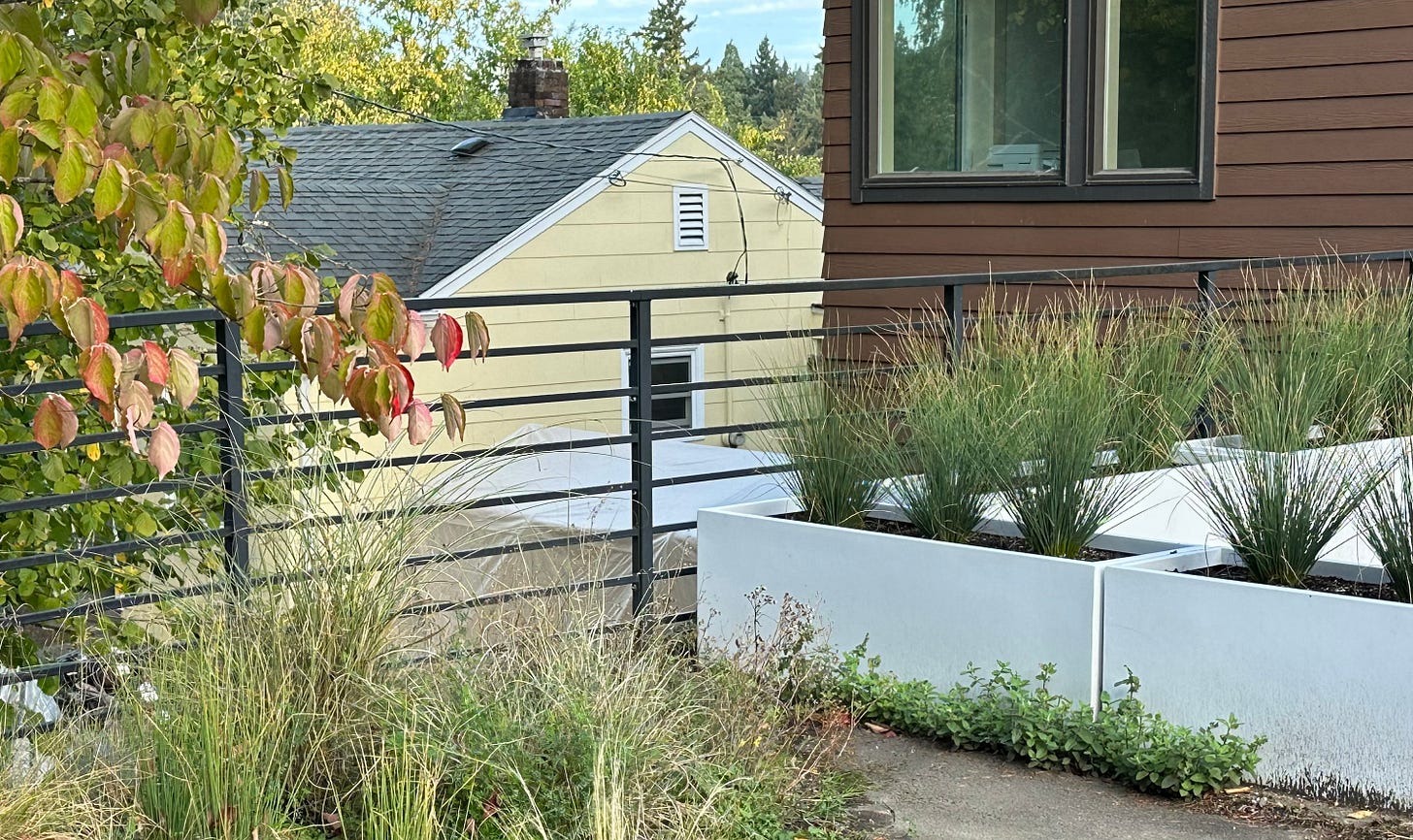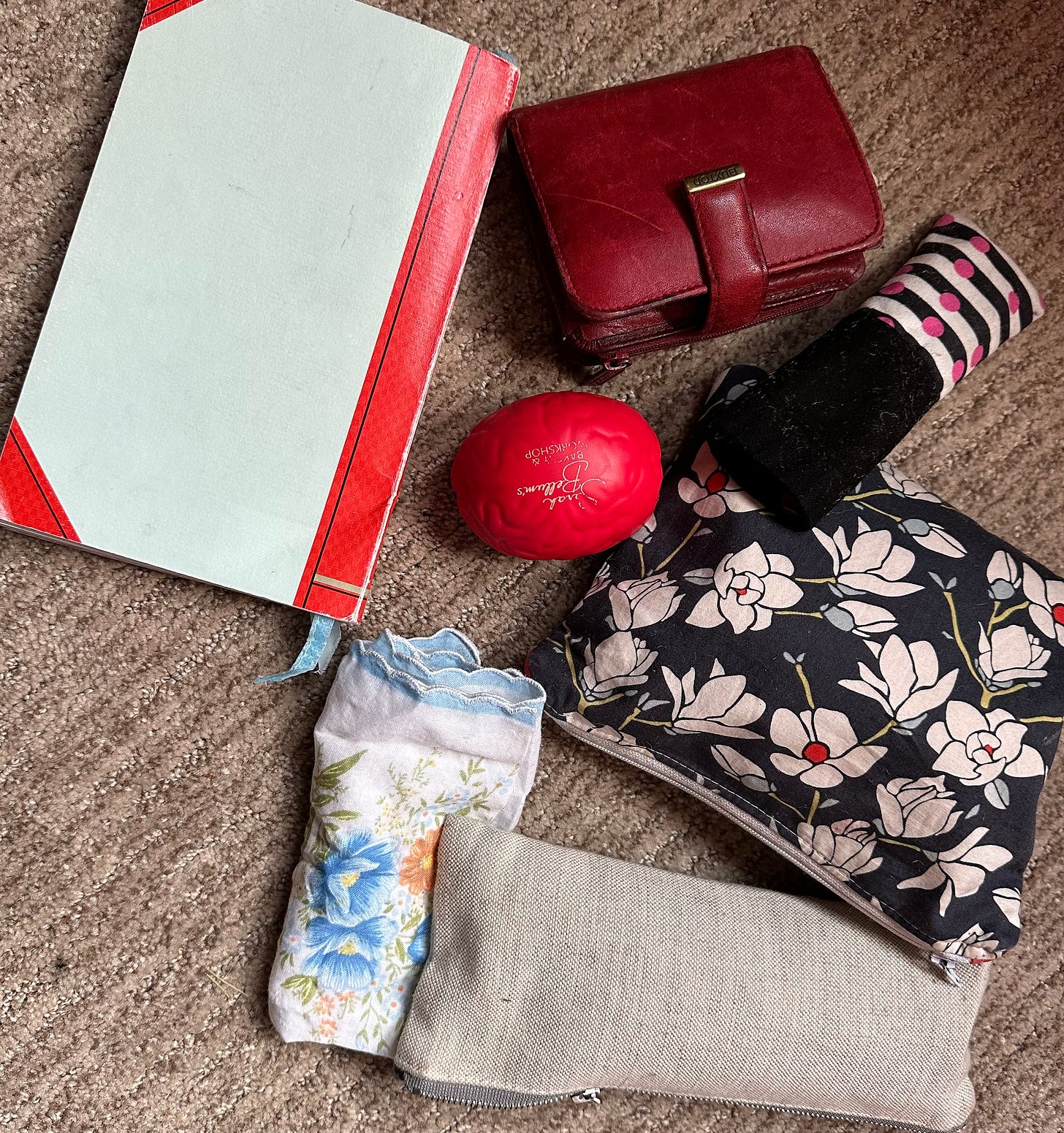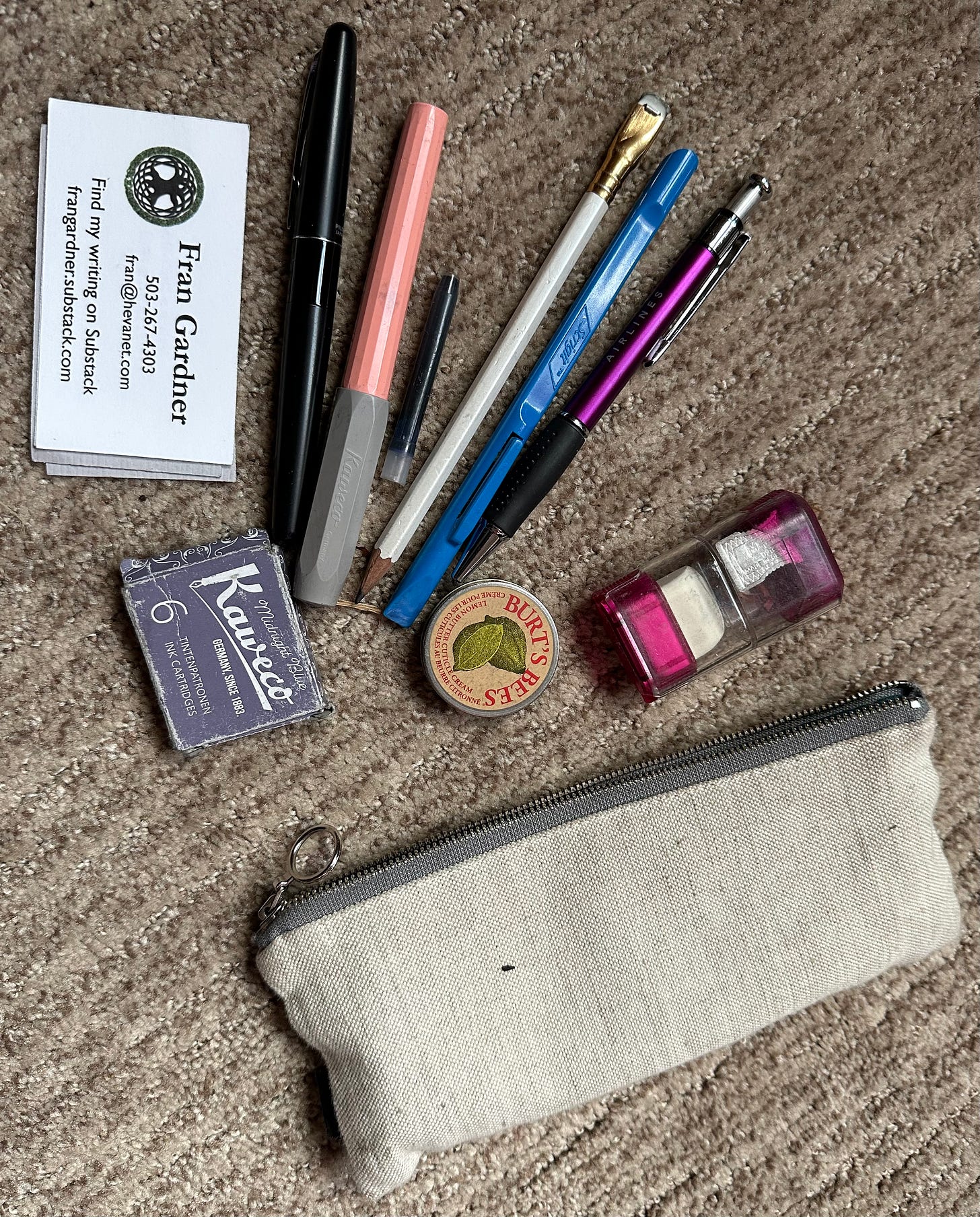Check in
Someday, I’d like to write a book about edges. They are so vital to the way we experience the world.
That’s because it’s at the edges, the verges, the borders, where ideas and longings and purpose begin and end and intersect, that change happens.
Those are the places where words stand on their heads, jostling to be read and understood.
There is tumult at the edges, like the ocean crashing on rocks.
Celebrate the edges in your life. Remember that you never eat a cookie from the center out.
This photo, outwardly so mundane, shows a multitude of edges, corners, borders, drop-offs. How many stories these images could generate!
Words at the Edge of Bitterness and Regret
Stop, please stop, Leave the hurting words unsaid Be the third monkey, hands before its mouth. Let edges be totems, angels of your dreams Building out from the Universe. Let them be purpose, as new-sawn wood, Or chaos, as sharp shards, broken things. Edges can crush or redeem us Jarring, jagged, juxtaposed, Or orderly, snapped into place, your jigsaw complete. The edge of sound: The owl romances the night Hoot-woo, hoot-woo, Then silence as the forest breathes again. The edges of morning: Sunglow creeps from the east, caressing the trees. Two tiny birds dance, gyrating in concert, Aware only of each other, joy in motion. Mourning doves coo; the frogs keep mum. Delivery trucks rumble past dog walkers. The edge of psyche: Where does consciousness drop off Into slumber? You dip your toe in water that will engulf you. The edge of disability: A hand, a foot, a leg that won’t, can’t function. Memory that deceives memory. Nothing works as it should. Keep the edges of your life Safe to you Sharp edges can cut, but you know that. Your pain has its own edges. Soothe them now.
The eternal we
From the bus, I saw a sign on Southwest Harrison, part of a poem on a building. It said
We breathe
In the next block, a sign on a copy shop:
We print
What other “we” messages could I find?
That same day, I saw a USPS truck with this message:
We deliver for you
And a Jiffy Lube:
We do brakes
But the best “we” message of all is a sign at Gills Point S Tire & Auto on the Beaverton-Hillsdale Highway at Shattuck Road:
Purses lost, purses found
This last week, I lost a purse, I found a purse and I missed out on a pink purse. Then, just a few hours ago, I lost again.
Nearly gone
The first purse I lost fell off my lap as I was exiting a bus. Fortunately, someone found it right away. By the time I realized it was missing (with a skipping heartbeat; I bought that bag in Germany and its loss would wound me), I had a text message with a photo of the bag.
The person who found it, Amanda, also found my business card inside with my phone number, my email and my Substack address. (Also in the bag: small hard candies. When I write poems for strangers, I give them a business card and a candy or two.)
We met by the sunflowers at the corner of Southwest Sunset and Dewitt. I resolved to sling the purse over my shoulder instead of holding it on my lap.
I use the small bag when I venture out to write poems for people. I park the chair somewhere where there’s foot traffic, put a sign around my neck:
Let me write you a poem! (It’s free)
and wait hopefully for people to notice me. Thankfully, someone always does. I channel a small poem, write out a fair copy, and give it away with a piece of candy.
Bigger bag
There’s one bag I carry all the time, on my lap or between my feet on the footrests. It has all my necessities.
I found the one I’m using now for $2 at the Clinton Street Fair in September. It’s made from a jute sack that once held 15 pounds of basmati rice from India.
Here’s what’s inside: journal, pencil case, wallet, reading glasses, red stress ball shaped like a brain, hankie.
Inside the pencil case: fountain pens, refills, a pencil sharpener with an eraser, a tool Lyza gave me that scrapes and lifts stickers and labels, business cards and a special pencil, also from Lyza. It’s a Blackwing Pearl, incense cedar surrounding graphite that writes cleanly and doesn’t smudge, with a singular square eraser that’s replaceable. It doesn’t smudge, either. Lyza gave me the pencil case, too.
Found object
A few days after I got my purse back, I found another small one on the floor of a small office building on Southeast Division. This bag, alas, did not have a business card or any other identification. Its only content was a Trimet Hop Fastpass card. We set the bag on a low bench in hopes that the owner will find it.
Pink purse adventure
I debated even writing about this purse, because my reaction to it is so bizarre. But here goes:
I was heading downtown along the Barbur Extension, a thruway that parallels the Willamette River, when I saw a bright pink purse lying on a parapet.
It was at the entrance to Tillicum Crossing, the new bridge over the Willamette that is only open to bus, streetcar, bike and foot traffic—no cars.
A sidewalk parallels the roadway there, but there’s no foot traffic, so nobody was likely to pick up the purse. It was still there when I rode the bus back home about six hours later.
Just lying there
I was intrigued by this bag, a bright Pepto-Bismol pink, probably plastic. I wanted to check it out, yet I couldn’t make myself press the “next stop” button. The next stop was about a mile further on, anyway, and I was late for dinner.
But I thought about that purse all night. What was it like? Well-made or chintzy? Would I want to carry it? Would there be information about the owner? I could do a good deed and return it. What if it had money in it? Like, $2,000?
It was fun to fantasize. But then I went further.
Dry well
The next day, I set out early to check on my fantasy pink purse. Of course it would be gone. I knew that. But what if it were still there? I needed to know. Besides, I was enthralled by its pinkness.
The bus rolled past the Tillicum Crossing entrance. No purse. Still, I got off the bus and rode up to check it out. Maybe it had fallen behind the low wall. But no, there were some homeless tents behind the wall. No purse.
So, if there was money in the purse, folks who needed it got it. I somehow don’t think the owner reclaimed it. But maybe. That would have been the best outcome.
So, onward
Not finding the purse was a disappointment, but it gave me a chance to explore Portland Center (now the Harrison Apartments), a 1960s era development near the waterfront with tall concrete apartment/condo towers and pedestrian-only promenades.
I made my way over and up to Portland State and had a wonderful breve at a modest coffee shop on Fourth Avenue that was full of sunlight and aluminum tables. The Korean couple who own Sunny’s offer a bi bim bap special on Thursdays and Korean roast pork on Wednesdays. Must go back.
I had more adventures on the way back. I needed some cream, so I stopped at the Albertson’s close to where I live. Total wash. They don’t even sell regular cream; ultra-pasteurized only. Took another bus to Fred Meyer, which had cream. I could have rolled back home, but I boarded yet another bus back cause it was starting to rain.
Why pink?
The pink purse drew me because of its color, so incongruous against the gray concrete of the wall. I’ve had a strange fascination with pink these past few years.
Growing up, I despised pink. It was the color of oppression, the color of the boudoir ghetto that girls were forced into. Even as a child in the 50s and 60s, I wanted to be a boy. Why should they have all the privileges? And boys definitely weren’t pink.
Blue was my favorite color in those days, and then, as I entered my 30s, it was green. But when I was about 65, I suddenly discovered pink. My prejudices were forgotten. I love it now!
Pink is such a happy color.
Is it a purse or a bag?
I like the word “bag.” “Purse” sounds prissy. There once was a difference, in that a purse was a small container and a handbag a larger one. I never say “handbag,” though. Don’t know why.
Most women just say “purse.” Leave it at that.
Smoke in the fall air
Sometimes, when I’m out in the neighborhood, I smell wood smoke from fireplaces in private homes. But even wood-burning fireplaces are on the way out, being replaced with gas logs, warm and cheerful but with no scent.
Some changes have to happen. New kids coming up won’t even miss the scent of woodsmoke. They have their own memories.
Autumn Smoke
Fall used to mean smoke Leafy bonfires, Warmth on our faces, Potatoes tucked amid the embers. But then we cared About air quality, And burning leaves . . . We turned that page. The Amazon Basin burns, But not our backyards. Progress of a sort: No more campfires, either. Melt those marshmallows. In the microwave. The half-burned gooiness We loved while camping— Forget about that. Age matters for something: At least I have those memories, Like eating the charred parts, too. Today’s children Have marshmallow treats. So many things are better now. Just remember that. Yet spare a quick thought For the fires of our youth.
Followup
Japanese sand dollar
Last week, I wrote about how studying a sand dollar sparked my thinking about fives in nature. I noted that Yutaka Nishiyama of Japan’s Osaka University of Economics had written an article in a mathematical journal about fives, including flowers with five petals.
I try to let people know when I mention them in my writing, so I contacted Professor Nishiyama, who wrote back:
In 1983, my wife found a sand dollar at the beach during our family trip (say hasunohakashipan in Japanese). I was impressed by [the] mysterious pentagon, and started to study starfish, flower, and fingers.
That is, he went through the same thought process I did, being intrigued by the five-fingered marks on the sand dollar and moving to other examples of fives.
Here is the sand dollar his wife found:
Check out
I haven’t written about two subjects I try to touch on often: writing and the monthly resolution.
Writing is special to me, a way of spilling my essence out to anyone who reads it. I take great joy in creating, and in sharing.
My wish for you, always, is that you will discover the power of writing, if you haven’t already. Let me know in the comments if I am hammering too hard on this topic.
The resolution for October is “home and away.” I have things to say about that, but other topics pushed them to next week.
One thing I want to explore is going away to college. Do any of you recall what it was like leaving home? Feelings of freedom or fear? Anticipation or trepidation? Email me, fran @hevanet.com, or leave a comment. I’ll try to fold your stories into my narrative.
Naked appeal
If you’ve been reading and enjoying Becoming, consider becoming a paid subscriber. Substack won’t let me offer subscriptions of less than $5 a month or $50 a year. That seems like a lot. But you could think of it as roughly $1 an issue.
Whatever you decide, I’m glad you’re here. And I hope you will return next week.
In the meantime: Remember to be true and authentic. Know that you are loved. Be. Here. Now.
This just in
I have sad news to report about a purse, and it didn’t work to add it to the copy above. So I put it here.
I rode the wheelchair, now re-christened Zippy, to take the picture of the gluten-free oil change sign this morning (Saturday, Oct. 14). On the way back, I stopped to buy a breve at Dutch Bros. Coffee. That is the last time I remember handling my basmati rice bag.
Sometime in the late afternoon, I went looking for my bullet journal. That’s when I realized the bag was not in my apartment. This is the basmati bag, the one pictured above. I had my phone, because it was in another bag I had on my lap.
As of now, all that was in the basmati bag is missing. No one has called to say they found it, although there is contact information in the journal and business cards in the pencil case.
I did go out looking for it, twice, retracing my route along the Beaverton-Hillsdale Highway. No sign of it. I can’t imagine it could have slipped away from between my feet. I can’t imagine how I lost it.
The big blow here is the loss of the journal, started in July and about 80 percent full. It had all my notes, poems I hadn’t yet transcribed, calendars. Losing it is heavy.
Now I have to cancel the credit cards and think about getting a new driver’s license. All the headaches that come with losing a chunk of my life.
I hate regret. And now I regret that I lost it and that I didn’t even miss it until hours had passed.
I will weather this loss. Someone may still contact me. Just give me some time, is all.
—30—











Wood smoke is so primitive, it is embedded in the DNA. Urban children has long since lost the campfire experience as evidenced during one campfire party we attended at a school in Santa Cruz. Unfolded metal hangers were passed out to the children and the lack of spacial awareness of these kids made for a harrowing experience of potentially poked eyes and impaled faces. It was nuts! As for experiencing wood smoke, it seemed beyond their notice. This is truly a sad poem, Fran, on so many levels. We heated our houses with wood for 25 years, yet our daughter could never learn how to set and light a fire. Her generation can't live without an app or a button to push. (Okay, off my soapbox.)
The "edges" poem is so evocative, it pulls memories or scenarios for the future out of my thoughts to distract me. It is a poem to be read slowly so as not to miss one evocative word.